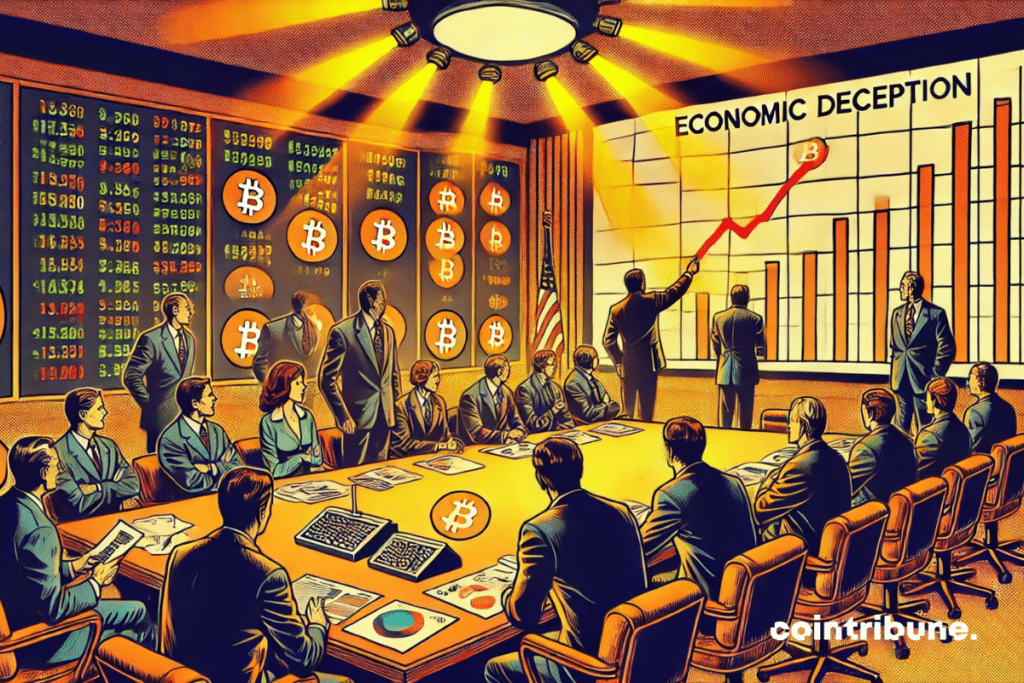17h05 ▪
4
min read ▪ by
Trust in the U.S. economic figures is wavering. In the shadow of institutional speeches, another voice is being heard, more biting, more direct: that of the Bitcoiners. Leading them is Anthony Pompliano, an essential figure in the crypto sphere, who denounces the growing disconnection between official data and lived reality.


The flaws of official statistics
The criticisms are not new. Pompliano insists: “The Bitcoiners were the first to see that the economic data was false“. He criticizes the underestimated inflation, the revised employment figures, and a GDP growth that he deems largely overstated. He relies on the very admission of U.S. Treasury Secretary Scott Bessent:
No, I do not trust the data.
Behind these words lies a wider concern. A 2024 study by the American Statistical Association already alerted:
Our public statistics are as vital as our roads. They are neglected until they break down.
Reduction of budgets, collapse of survey response rates, political interference: the statistical foundations are crumbling.
Bitcoin as a response to distrust
In light of this observation, Bitcoiners do not just criticize. They act. “They found a way to financially capture the rise, if they were right,” writes Pompliano. And the bet seems to be on the verge of being won. While traditional markets sway under the blows of Trump’s trade war, Bitcoin asserts itself as a safe haven.
On April 4, when the stock market stumbled, the price of bitcoin surged above $84,000. A rare counter-cyclical move, praised by analysts as a sign of increasing independence from stock exchanges.
For Pompliano, this resilience proves that Bitcoin is not just a speculative asset. It’s a critical tool, an alternative economic thermometer, disconnected from institutional channels.
“The dollar falls, and Bitcoin rises. It’s as simple as that“, recently asserted Jeff Parks of Bitwise.
Distorted data, muddled politics
The Federal Reserve, meanwhile, seems paralyzed. “Interest rates are too high, but the Fed is hiding behind official data“, exclaims Pompliano on LinkedIn. He reminds us that the Truflation index, which is more in line with real prices, shows an inflation rate of 1.7%, well below the 2.8% claimed by the government. Such a divergence has heavy consequences for households, businesses… and cryptocurrencies.
“If we cannot trust the figures, how can we make informed decisions?“, questions Pompliano. He is not the only one alarmed by this. The report “The Nation’s Data at Risk” highlights the danger of a gradual collapse of the public statistical system. These are the data that drive interest rates, social assistance, and markets.
Towards a new monetary standard? In this context, the idea that bitcoin could supplant the dollar is no longer just fiction. Some analysts mention a transition to a fragmented reserve system where “hard currencies” like gold… or Bitcoin, would gain legitimacy. This is perfectly summarized by Pompliano:
A public financial conversation has become an intellectual deadlock where people regurgitate opinions based on faulty data.


As the foundations of the official economic narrative falter, Bitcoiners stand as critical trailblazers. Their strategy? No longer to blindly trust the figures, but to rely on their experience, their network… and the blockchain. The future will tell if their reading of the world was correct. But one thing is certain: they now have the ear of a public in search of bearings.
Maximize your Cointribune experience with our “Read to Earn” program! For every article you read, earn points and access exclusive rewards. Sign up now and start earning benefits.
La révolution blockchain et crypto est en marche ! Et le jour où les impacts se feront ressentir sur l’économie la plus vulnérable de ce Monde, contre toute espérance, je dirai que j’y étais pour quelque chose
DISCLAIMER
The views, thoughts, and opinions expressed in this article belong solely to the author, and should not be taken as investment advice. Do your own research before taking any investment decisions.




